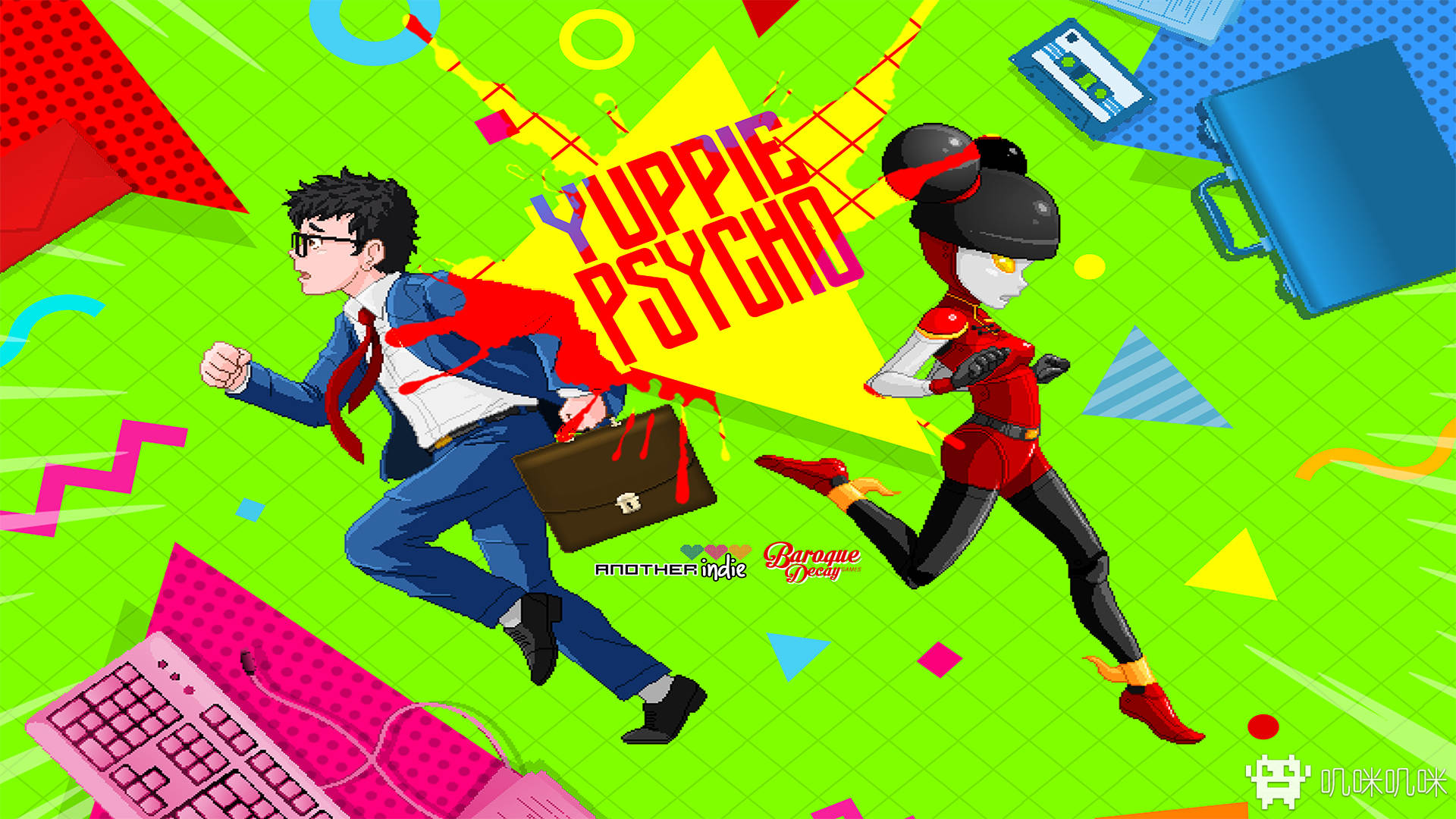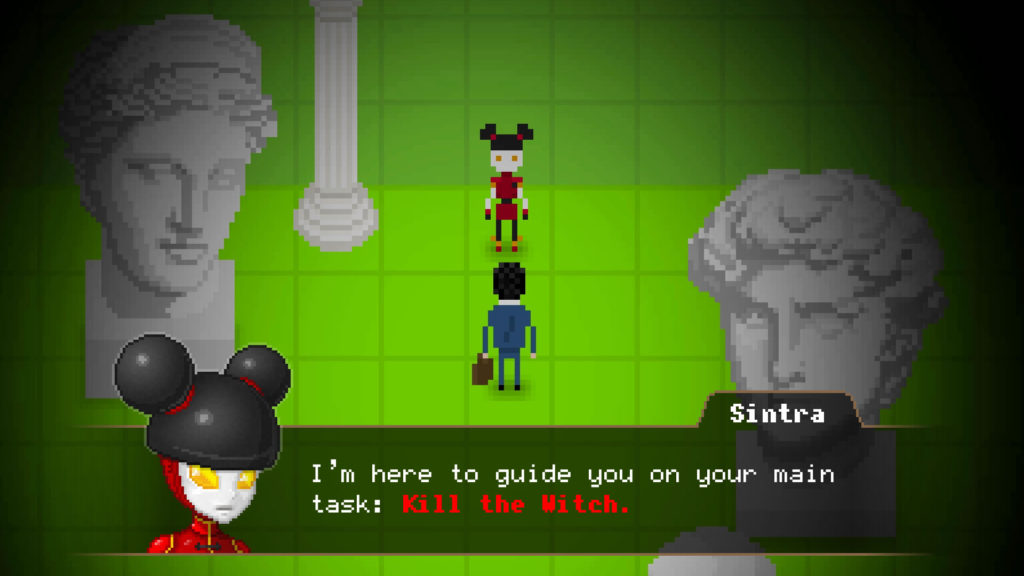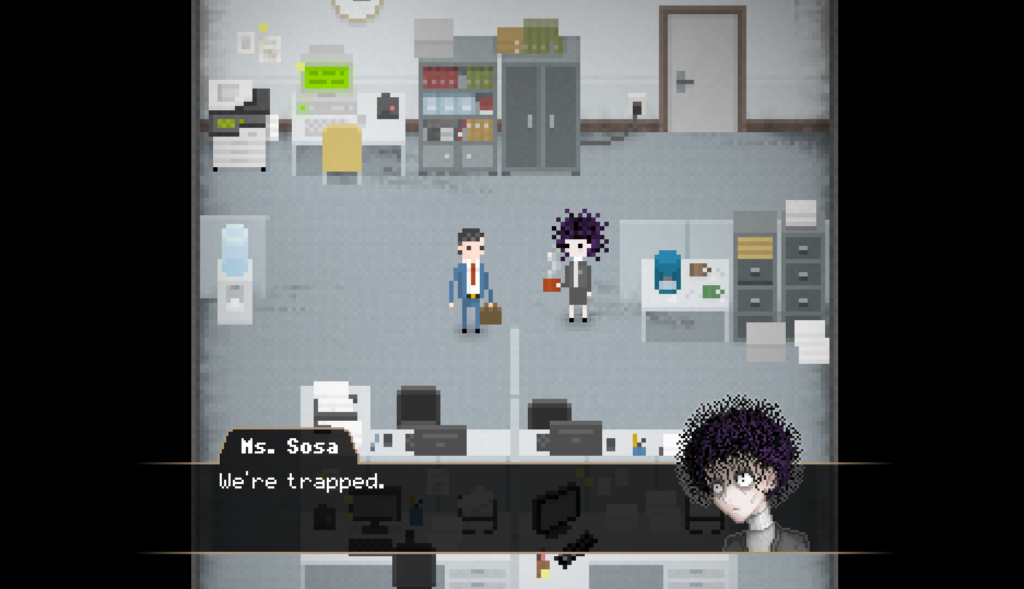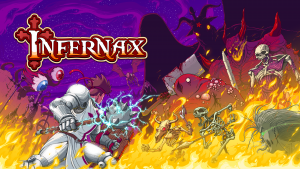
The first day at a new job can be a stressful experience. There’s the jittery anticipation of meeting your new coworkers, the fear of the unknown, and for some, there are lingering doubts about being qualified. Yuppie Psycho hones in on these anxieties with precise acuity, translating these underlying terrors into survival horror. The opening scene, presented in pixel-art animation, tells us all we need to know. We see our protagonist, Brian Pasternack, make his way to work on the subway. He is surrounded by blank impersonal faces, wracked with doubt but desperately hopeful.
Brian seems to have received a golden ticket, a job letter to work at Sintracorp, one of the most prestigious and sought after companies in the world. But he knows he isn’t qualified, and that his lowly class designation should have made landing such a job impossible. In this society, citizens are divided into lettered social classes due to rampant economic inequality, and Pasternack sees this job as a means to move himself and his family out of poverty. But of course, there’s a catch. Upon arriving at Sintracorp’s HQ, he quickly realizes that something is terribly wrong with this place. In short, there is a monster at work in the building, manipulating the drones of workers to its whims. And Brian is tasked with killing that monster, referred to as the Witch.

While the horror in Yuppie Psycho is generally explained in the logic of the world, that doesn’t make the proceedings any less unsettling or absurd. The result is something of a mix of Kafka and Lovecraft, bureaucratic insanity bleeding into the occult. Although your coworkers’ actions are partially due to the thrall of the Witch, they do willingly sacrifice their bodies and minds to their corporate overlords without a second thought, all in the vague hope of moving up the ladder. And when you witness the depths of the depravity that they’re willing to undergo, the Kafka-esque absurdism fully kicks in.
The most striking aspect of the game is how it explores notions of classism and unseemly corporate practices through the trappings of horror. By throwing us in the throngs of this heightened depiction of the workspace, we see the effects of unhealthy work mentalities, corporate hive-minding, hazing, and social climbing. The band of coworkers you meet along the way fits into these notions, with Machiavellian businessmen, workaholics, and the occasional fellow rebel. The character writing is also surprisingly funny, your small band of fellow corporate cynics offering some much-needed levity amongst the terrors of this building. The central mystery of this cursed firm unspools through discovering bits and pieces of lore along the way. While admittedly the story comes together somewhat hastily in the third act, undermining a lot of the build-up, the process of uncovering the strange workings of this place and getting to know its characters are a great deal of its appeal.

Although this world is mostly presented in fairly simple pixel art, there is a precise sense of ambiance and tone that stems from this demonic office. The Sintranet, a virtual reality space that you enter to receive your orders, evokes a Vaporwave aesthetic that is in striking contrast to the dimly lit hallways filled with viscera found elsewhere. The sound design is haunting and is accentuated by the minimalism of the visuals. The laughs of a broken employee or the pained wheezes of a fellow hunter reverberate through the halls with piercing specificity. The soundtrack builds on this with a mixture of instrumentation and synth wave, marrying the retro-futuristic aesthetic with its Gothic undertones.
But the tension doesn’t just come from the sound design, as mechanically this is very much a survival horror game. You must explore the dilapidated halls of Sintracorp, discovering its secrets as you inch towards your goal of killing the witch. Traversing the building for the first time is largely tense and rewarding, and does a good job of nudging the player in the right direction, sometimes subtly. Similarly, the puzzles feel somewhat cryptic but not overly obtuse, with enough clever hints to guide you towards the answers. To stand a chance, scavenging resources is essential. Candy bars, sandwiches, instant ramen, and of course coffee can be found or crafted for healing purposes. Batteries must be managed closely, as they power your flashlight. Most notably, you are even required to use resources to save, a design choice reminiscent of early Resident Evil games, with almost no-autosaves to be found.
While this draconian mechanic does evoke stress, this stress is generally caused by the immense slog of repeating areas. The majority of the gameplay is based around exploration and puzzle solving, elements which are worthy in their own right the first time through, but tedious the second. After having explored an area or solved a puzzle, it often feels like busy work to get back to your point of death. Normally the variable that would make repeating areas unique or interesting would be the enemy encounters. But in this case, these moments are the most problematic, as most of the time when you see a monster you must simply try your best to hide from erratic enemy AI. Similarly, the “boss” sequences drag once you’ve figured them out, and there was one particular underwater area that was extremely trying. Admittedly the amount of the saving resource in the world feels reasonably generous, but being forced to repeat certain sequences because you forgot to save or were being overly conservative is definitely the low point of the experience.

Despite a few frustrating sequences and a rushed conclusion, Yuppie Psycho succeeds as a tone piece that explores the dismal undercurrents of office life. Sintracorp HQ’s corridors are filled with unsettling happenings that meld cohesively with its social commentary, offering a foreboding but enticing world to explore. Brian’s companions offer welcome breaks from the terror, while also giving us a reason to care about the ultimate conclusion of the proceedings. While I wish the save system was slightly less punishing, Yuppie Psycho succeeds as a tense puzzle-adventure experience and a pointed critique of corporate life.
Rating 7.5/10







